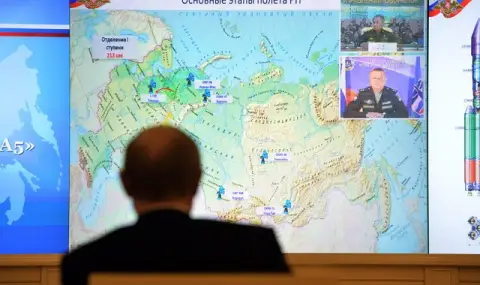Russian forces hit civilian infrastructure and military training facility in the city of Poltava with two Iskander-M ballistic missiles. The strikes killed or injured a large number of people, as part of a larger series of strikes on the night of September 2-3.
The Ukrainian Air Force reported that Russian forces fired three Iskander-M/North Korean KN-23 ballistic missiles from occupied Crimea, a Kh-59/69 cruise missile from Kursk Oblast, and 35 Shahed-136/131 drones from Kursk Oblast and occupied Cape Chauda, Crimea .
The Ukrainian Air Force reported that it shot down 27 Shahed drones over Kyiv, Odesa, Kharkiv, Mykolaiv, Kherson, Poltava, Chernihiv, and Sumy regions, that six Shaheds missed their target, and that two Shahed drones flew toward Belgorod Region and the occupied Donetsk region.
This is reported by the "Institute for the Study of War" in its next analysis of hostilities. (ISW).
Ukrainian President Volodymyr Zelensky and Ukrainian Commander-in-Chief General Oleksandr Sirsky announced that two "Iskander" hit a military educational institution and a nearby hospital in the city of Poltava, partially destroying a building of the Poltava Military Communication Institute.
Zelensky said the strike killed at least 51 people and injured at least 271 others.
Zelensky stressed Ukraine's need for more air defense systems and interceptors and called on Western countries to lift restrictions on long-range strikes against military targets in Russia, as such restrictions prevent it from defending itself against Russian long-range strikes.< /p>
Ukrainian Foreign Minister Dmytro Kuleba told CNN on September 3 that only the Patriot and SAMP/T air defense systems are capable of intercepting Russian ballistic missiles.
The results of the Ukrainian invasion of the Kursk region on the war and the diplomatic solution to the war are still unclear and assessments are premature. Zelensky said during an interview with NBC on September 3 that Ukrainian forces plan to hold territory in Kursk Oblast for an indefinite period of time, but did not elaborate on the goals due to operational security concerns.
Zelensky repeated that this from part of the "plan for victory" of Ukraine to end the war on fair terms and to bring Russia to the negotiating table. Ukraine intends to exchange Russian prisoners of war captured in the Kursk region with Ukrainian prisoners of war currently in Russian captivity, he added.
He reiterated that one of the aims of the invasion was to force Russia to redeploy front-line troops across Ukraine, particularly in eastern Ukraine. Zelensky said Russia had diverted approximately 60,000 troops from Ukraine to Kursk Oblast. Ukrainian commander-in-chief General Sirsky announced on August 27 that Russia has redeployed more than 30,000 front-line troops to Ukraine in the Kursk region.
ISW has observed indications for several weeks that the Russian military command is redeploying forces from northern Kharkiv Oblast, the Kupyansk-Svatov-Kreminna line and western Zaporozhye Oblast to Kursk Oblast, and has recently observed indications that the Russian military command is redeploying forces likely intended for future offensive operations with a higher priority in the Pokrovsk direction to the Kursk region.
Russian President Vladimir Putin has so far avoided redeploying the type of combat-effective and experienced front-line units likely to be needed to push Ukrainian forces out of Kursk Oblast, and Zelensky's statement suggested that Ukrainian forces are likely to maintain positions in more than 1,100 square kilometers of territory where Ukrainian forces are reported to be operating in the Kursk region until Putin chooses to send such forces. ISW assesses that Putin is trying to preserve the Russian attack on Pokrovsk at the expense of a delay in Kursk, but that the invasion is likely to have mixed effects.
While the Ukrainian incursion into Kursk Oblast appears to be having an operational-level impact on the Russian military, it has yet to change Putin's thinking at a strategic level. Putin believes that Russia can slowly and indefinitely absorb Ukraine. Russia can achieve its goals through a war of attrition against Ukrainian forces and despite continued Western support for Ukraine — assessments that make Putin unwilling to negotiate peace on any terms other than Ukrainian and Western capitulation to his demands.
Putin concluded his visit to Mongolia by signing agreements that strengthen bilateral economic ties and trilateral energy relations between Russia, Mongolia and the People's Republic of China (PRC).
Putin and Mongolian President Ukhnaagiin Hurelsukh highlighted the increase in projects under the Mongolia-Russia-China Economic Corridor Program, which supports Russia's Greater Eurasian Partnership economic initiative, China's Belt and Road Initiative. and Mongolia's development plan "The Way of the Steppes".
Putin emphasized that the "Soyuz Vostok" gas pipeline connecting Russia, Mongolia and the People's Republic of China is fully built and awaiting state expertise.
Putin invited Kurelsukh to the BRICS forum in autumn 2024 and suggested that Mongolia join the BRICS Plus/Outreach format.
South African President Cyril Ramaphosa and President Xi Jinping of the People's Republic of China (PRC) issued a joint statement praising each other's alleged efforts to address the war in Ukraine. The two presidents released a joint statement on September 2 in which they expressed support for the joint proposal of the PRC and Brazil for a "political settlement of the Ukrainian crisis" and the African Union's efforts to resolve the war in Ukraine.
The two leaders confirmed that dialogue and peace talks are essential for a lasting solution to the war. They urged Russia and Ukraine to adhere to three key principles that benefit Russia: avoiding battlefield expansion, preventing escalation of fighting and refraining from provocations. ISW continues to assess that the PRC's peace plan is favorable to Russia. Several African countries have sought to strike a balance between Ukraine and Russia to maintain long-standing bilateral relations with Russia without officially expressing support.
